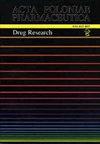没食子酸对糖尿病小鼠肌肉萎缩及握力的保护作用
IF 0.4
4区 医学
Q4 PHARMACOLOGY & PHARMACY
引用次数: 0
摘要
肌肉萎缩是糖尿病的常见并发症。没食子酸(GA)对高血糖和肌肉功能具有多种生物学作用。然而,GA是否能改善糖尿病期间的肌营养不良尚不清楚。我们的数据表明,GA通过增加肌细胞面积和握力来减轻肌肉功能障碍。在血清中,GA提高了T-AOC、SOD和CAT水平,降低了MDA、TNF-α和IL-6水平。在腓肠肌中,GA通过减轻F-box蛋白32(FBXO-32)和含三元基序63(TRIM-63)的表达来抑制蛋白质降解。GA对抗糖尿病相关肌肉萎缩的机制与其通过减弱DDIT-3(DNA损伤诱导型转录物3)和热休克蛋白5(HSPA-5)的表达来调节内质网应激密切相关。此外,GA通过增强核呼吸因子1(NRF-1)和PPARG共激活因子1α(PGC-1α)的表达来提高线粒体的生物活性。最后,GA通过增加BCL2相关X蛋白(BAX)的表达和降低BCL2凋亡调节因子(BCL-2)的表达来抑制细胞凋亡。总之,GA通过调节内质网应激、线粒体功能和细胞凋亡来预防糖尿病肌病。这些数据表明GA可能是一种新的治疗糖尿病肌肉萎缩的策略。本文章由计算机程序翻译,如有差异,请以英文原文为准。
Protective effect of gallic acid on muscle atrophy and grip strength in diabetic mice
Muscle atrophy is a common complication in diabetes mellitus. Gallic acid (GA) possesses multiple biologic effects in hyperglycemia and muscle functions. However, whether GA can ameliorate muscular dystrophy during diabetes is unknown. Our data demonstrated GA alleviated muscle dysfunction by promoting myocyte area and grip strength. In serum, GA enhanced T-AOC, SOD and CAT levels, and reduced MDA, TNF-α and IL-6 levels. In gastrocnemius, GA restrained protein degradation by mitigating F-box protein 32 (FBXO-32) and tripartite motif-containing 63 (TRIM-63) expressions. The mechanism of GA against diabetes-associated muscle atrophy is closely linked to its regulations on endoplasmic reticulum stress by attenuating DDIT-3 (DNA-damage inducible transcript 3) and heat shock protein 5 (HSPA-5) expressions. Moreover, GA improved mitochondria bioactivity by enhancing nuclear respiratory factor 1 (NRF-1) and PPARG coactivator 1 alpha (PGC-1α) expressions. Lastly, GA suppressed apoptosis by increasing BCL2-associated X protein (BAX) expressions and decreasing BCL2 apoptosis regulator (BCL-2) expressions. In conclusion, GA prevented from diabetic myopathy via its regulations of endoplasmic reticulum stress, mitochondria function and apoptosis. These data suggested GA could be a newer strategy against diabetic muscle atrophy.
求助全文
通过发布文献求助,成功后即可免费获取论文全文。
去求助
来源期刊
CiteScore
0.80
自引率
0.00%
发文量
74
审稿时长
6-12 weeks
期刊介绍:
The international journal of the Polish Pharmaceutical Society is published in 6 issues a year. The journal offers Open Access publication of original research papers, short communications and reviews written in English, in all areas of pharmaceutical sciences. The following areas of pharmaceutical sciences are covered: Analysis, Biopharmacy, Drug Biochemistry, Drug Synthesis, Natural Drugs, Pharmaceutical Technology, Pharmacology and General.
A bimonthly appearing in English since 1994, which continues “Acta Poloniae Pharmaceutica”, whose first issue appeared in December 1937. The war halted the activity of the journal’s creators. Issuance of “Acta Poloniae Pharmaceutica” was resumed in 1947. From 1947 the journal appeared irregularly, initially as a quarterly, then a bimonthly. In the years 1963 – 1973 alongside the Polish version appeared the English edition of the journal. Starting from 1974 only works in English are published in the journal. Since 1995 the journal has been appearing very regularly in two-month intervals (six books a year). The journal publishes original works from all fields of pharmacy, summaries of postdoctoral dissertations and laboratory notes.

 求助内容:
求助内容: 应助结果提醒方式:
应助结果提醒方式:


